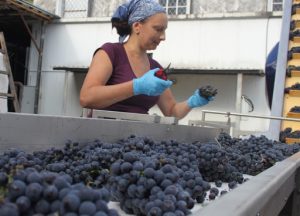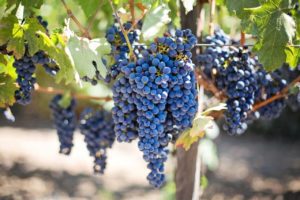
President of Ukraine Volodymyr Zelenskyy has signed the European integration law No. 3928-IX “On Grapes, Wine and Viticulture Products,” the press service of the Verkhovna Rada Committee on Agrarian and Land Policy reports.
According to the report, the law was adopted to bring the norms of sectoral legislation in line with the requirements of international rules for the production of viticulture and winemaking products, as well as to implement the provisions of the European Union’s regulations on viticulture and winemaking, oenological practices, production of flavored wine products, use and protection of geographical indications of wines, flavored wine products, and control in this area.
The document provides for the introduction in Ukraine of requirements for the production and circulation of wines, viticulture and winemaking products, and flavored wine products with geographical indications similar to current rules in the EU.
In addition, the law provides for the definition of a mechanism for the protection of geographical indications in Ukraine, the introduction of new terms and definitions in accordance with the categories of European legislation, and the implementation of the rule on labeling and presentation of wine products.
The document establishes the principles for conducting inspections of wine production from the vineyard to the final product, defines controlling institutions and their powers, and specifies sanctions for violations of the requirements established by law.
Ukraine will create a unified state information system, the Viticulture and Winemaking Register, and provide for the possibility of state support for viticulture and winemaking.
It is expected that the law will help provide citizens with high-quality products produced in accordance with international rules with special properties due to the natural conditions of the territory of origin. New jobs and favorable conditions for the development of business entities of all forms of ownership will be created in rural areas.
The law will come into force on January 1, 2026.

The draft law “On grapes and wine products” (#9139) the government registered in the Verkhovna Rada on March 22 aims to implement relevant EU regulations on winegrowing and winemaking, enological practices, production of flavored wine products, use and protection of geographical indications of wine.
“At the same time, the purpose of the bill is to create a unified state information system “Vine and Wine Register”, which will include information on: producers of grapes; wine products; vineyard plots; mandatory declarations and other data on wine products provided by this law, the introduction of information in which is mandatory, ensuring the effective administration and state support of the viticulture and wine industry,” – also stated in the explanatory
The document implies the introduction of requirements for the production and circulation of wines, products of viticulture and winemaking, flavored wine products with geographical indications, similar to the current rules in the EU. In particular, blending of wine produced in Ukraine with imported wine as well as wine produced outside Ukraine is not allowed.
In addition, the bill provides for the possibility of state support for viticulture and winemaking in the framework of the general laws “On state support of agriculture” and “On the specifics of insurance of agricultural products with state support” without any details, except for the principles of objectivity, equality and proportionality.
The document also contains the principles of inspection of wine production from the vine bush to the final product, defines the controlling institutions and their powers and specifies sanctions, the explanatory note states.

Grape processing in Ukraine in 2020 decreased by 38.8% compared to 2019, to 75,980 tonnes, according to the State Statistics Service.
According to its data, of the total number of grapes processed into winemaking materials, the enterprises directly grew 27.4%, or 20,800 tonnes, and the rest of the raw materials were purchased from households.
In Odesa region in 2020, some 56,400 tonnes of grapes were processed and in Mykolaiv region 15,400 tonnes, which is less than in 2019 by 32.4% and 26.7% respectively.
The main varieties of processed grapes remain Cabernet Sauvignon with 13% (less by 23.5% compared to 2019), Muscat with 10.4% (less by 5.4%), Chardonnay with 9.9% (less by 33.6%) and Aligote with 9.5% (less by 48.7%).
The service said that the production of winemaking materials in 2020 decreased by 41.2% compared to 2019, to 5.68 million decaliters. At the same time, the production of table wine decreased by 42.5%, to 3.58 million decaliters, champagne and sparkling wines by 28.2%, to 1.36 million decaliters, and the production of cognac fell by about 90.5%, to 230,000 decaliters.
The decline in grape processing was reported to be mainly caused by adverse weather conditions. Grape growers in Odesa region complained about the dry winter and spring of 2020 with insufficient rainfall.
According to the State Customs Service, exports of Ukrainian wine and grape must in 2020 increased in quantity terms by 88.7%, to 16,620 tonnes, and in monetary terms by 9.6% to $13.08 million.
At the same time, the export volumes were significantly lower than imports, which last year increased by 15.6% in quantity terms, to 64,430 tonnes, and in monetary terms by 22.1%, to $179.23 million.
Exports of vermouth and other grape wine in 2020 amounted to 460 tonnes for $1.09 million (less by 23.7% and 34.8% respectively), while their imports to 3,790 tonnes for $8.09 million (an increase in quantity terms by 1.4% and a decrease in monetary terms by 12.6%).

Grapes processing in Ukraine last year (excluding the temporarily occupied territory of Crimea and Sevastopol, part of the JFO area) increased by 1.2% compared with 2017, to 274,052 tonnes.
According to the State Statistics Service, out of the total amount of grapes processed for wine materials, 26.2% were actually harvested by enterprises, and the rest was purchased from households.
Odesa region last year processed 52.2% of grapes, Mykolaiv region some 35.8%, while Kherson 10.8% of the total volume.
Wine production in 2018 rose by 5.5% compared with 2017, to 19.75 million decaliters, of which 47% are table wine materials, 25.7% materials for champagne and sparkling wine, and 25.3% are wine materials for cognac.